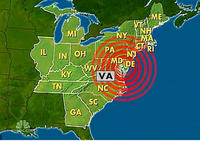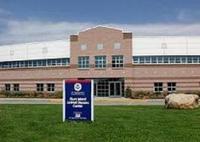-
Heat waves move toward California coasts, become more humid, imperiling health
Scientists detected a trend toward more humid heat waves which are expressed very strongly in elevated nighttime temperatures, a trend consistent with climate change projections; moreover, relative to local warming, the mid-summer heat waves are getting stronger in generally cooler coastal areas; this carries strong public health implications for the twenty-one million Californians living near the ocean whose everyday lives are acclimated to moderate temperatures
-
-
Last year’s east coast earthquake has the region preparing for another one

Last year an earthquake that was centered in Virginia shook up the entire east coast, surprising everyone; it did not result in any deaths and was considered relatively light compared to many tremors on the West Coast, but it was bad enough to force some states to prepare themselves in case of another quake
-
-
Activists in arms over plans to ship plutonium to New Mexico
A proposal to ship tons of plutonium to New Mexico, including cores of nuclear warheads which would be dismantled at a structurally questionable lab on top of an earthquake fault zone, has activists and nuclear watchdogs up in arms
-
-
NYPD monitoring of Muslim communities did not produce a single terrorist lead

An NYPDunit which gathers information on Muslim communities and businesses in order to uncover links to terrorist plots has been unable to do so in six years of engaging in monitoring Muslim communities in New York and New Jersey
-
-
Homeland security films informational but costly
Over the last four years the mayor’s office of Public Safety and Homeland Security in Houston, Texas, has spent $540,000 dollars to produce three short videos teaching people how to react in public safety emergencies; the price tag has some people upset
-
-
Court: Kentucky can continue to credit God for homeland security
The Kentucky Supreme Court has declined to hear a challenge to a state law that mandated that the commonwealth give credit to God for Kentucky’s homeland security; the Court let stand a 2011 Kentucky Court of Appeals ruling which found that a 2006 law, requiring the Kentucky Office of Homeland Security to publicize dependence on “Almighty God” in agency training and educational materials, did not violate the establishment clause in the Constitutional
-
-
New earthquake assessment finds increased risk for Washington Dams
Central Washington state has always been considered low risk for earthquakes back when big hydropower dams went up on the Columbia River many decades ago; a recently completed seismic hazard assessment, however, shows that there is a much greater earthquake potential for the area than previously thought; now, dam owners have to figure out whether their dams can hold up to an earthquake; if retrofits are needed, they could cost hundreds of millions of dollars
-
-
NYPD, Microsoft develop and deploy new surveillance system
The New York Police Department (NYPD) and Microsoft have teamed up to create the Domain Awareness System, which will analyze real-time safety data for use by NYPD investigators; the system will act as a communications hub which will allow a number of advanced counterterrorism systems to relay information to more than 1,000 people in the field
-
-
Improved disaster resilience is imperative for U.S: report
A new report from the National Academies says that it is essential for the United States to bolster resilience to natural and human-caused disasters, and that this will require complementary federal policies and locally driven actions that center on a national vision – a culture of resilience; improving resilience should be seen as a long-term process, but it can be coordinated around measurable short-term goals that will allow communities better to prepare and plan for, withstand, recover from, and adapt to adverse events
-
-
New U.S. biodedfense R&D network launched
On Monday, Texas A&M System dedicated a new research center which is part of a national network of centers aiming to develop strategies and products to counter bioterrorism, chemical and radiological attacks on the United States, and better strategies to deal with pandemics; the network will have facilities in Texas, Maryland, and North Carolina; the Texas dedication is the culmination of a Manhattan Project-like program for biological countermeasures, launched in 2004 by the Department of Health and Human Services; the research network aims to develop “rapid, nimble and flexible approaches” to vaccine and therapy development, and train the next generation of professionals to sustain U.S. capabilities in these areas
-
-
You want to report a pothole? There’s an app for that

The city of Boston offers residents a new app – Street Bump – which will automatically report potholes they encounter; all the driver has to do is install the app and place the smartphone on the dashboard or in the cup holder; the app uses the phone’s motion detector and GPS locator to report potholes
-
-
Scaled-back Kansas biolab would meet U.S. needs

A report by the National Research Council says that it is “imperative” that the United States build a large-animal biocontainment laboratory to protect animal and public health; two options are acceptable: a $1.4 billion Biosafety Level 4 laboratory in Manhattan, Kansas, or a scaled-back Kansas lab tied to a distributed laboratory network in other facilities; a third option will not meet U.S. needs: maintaining current capabilities at Plum Island Animal Disease Center, because the Plum Island facilities do not meet current standards for high biocontainment
-
-
California passes “Anti-Arizona” immigration measure

The California State Senate last Thursday passed Assembly Bill 1081 — some call it the Anti-Arizona law — under which local police officers would be limited to refer only those individuals convicted of serious felonies to immigration agencies; police officers would no longer have authority to detain lower-level offenders on their undocumented status
-
-
Deadline for ASIS Accolades Competition approaches
ASIS International 58th Annual Seminar and Exhibits will be held in Philadelphia on 10-13 September; one of the highlights of the show is the ASIS Accolades Competition, which is open to exhibitors in the event; Deadline for Submissions is 23 July
-
-
Many criminals who used guns in a crime were not legally barred from possessing firearms

Sixty percent of persons incarcerated for gun crimes in the thirteen U.S. states with the most lax standards for legal firearm ownership were not legally prohibited from possessing firearms when they committed the crime that led to their incarceration
-
- All
- Regional
- Water
- Biometrics
- Borders/Immig
- Business
- Cybersecurity
- Detection
- Disasters
- Government
- Infrastructure
- International
- Public health
- Public Safety
- Communication interoperabillity
- Emergency services
- Emergency medical services
- Fire
- First response
- IEDs
- Law Enforcement
- Law Enforcement Technology
- Military technology
- Nonlethal weapons
- Nuclear weapons
- Personal protection equipment
- Police
- Notification /alert systems
- Situational awareness
- Weapons systems
- Sci-Tech
- Sector Reports
- Surveillance
- Transportation
Advertising & Marketing: advertise@newswirepubs.com
Editorial: editor@newswirepubs.com
General: info@newswirepubs.com
2010-2011 © News Wire Publications, LLC News Wire Publications, LLC
220 Old Country Road | Suite 200 | Mineola | New York | 11501
Permissions and Policies
Editorial: editor@newswirepubs.com
General: info@newswirepubs.com
2010-2011 © News Wire Publications, LLC News Wire Publications, LLC
220 Old Country Road | Suite 200 | Mineola | New York | 11501
Permissions and Policies
